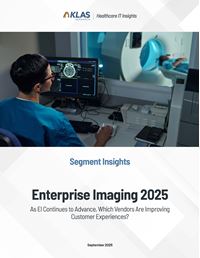 2026 BEST IN KLAS
2026 BEST IN KLAS
Preferences
Related Series


Enterprise Imaging 2018
How Top Organizations and Vendors Are Achieving Outcomes
The enterprise imaging market is evolving, and it is clear that success comes from deliberately executing a plan, not simply adopting technology. When provider organizations partner with vendors to leverage vendor experience, build strong governance, and carefully plan their strategy rollout, achieving outcomes in enterprise imaging is possible. KLAS interviewed 137 organizations in the United States live with enterprise imaging to shed light on what top-performing organizations and vendors are doing to drive success.
Industry Insight & Context
THE STATE OF ENTERPRISE IMAGING
As enterprise imaging matures, provider organizations are striving to achieve key outcomes: improved physician collaboration, access to relevant patient images, physician productivity, and data management. The market is still immature, but some provider organizations are starting to achieve their goals. This report examines what outcomes they are achieving, how vendors perform in key areas, and the role of both providers and vendors in enterprise imaging success.



State of the Market: You’re Not as Far Behind as You Think
Organizations with a truly mature enterprise imaging strategy have four key structural pieces in place: (1) organizational IT support and funding; (2) the ability to electronically ingest images; (3) a fully deployed encounter-based imaging strategy; and (4) strong governance. Today, gaps in these four areas are prevelant, regardless of how many service lines an organization has connected. Roughly one-third of organizations who have begun their enterprise imaging journey are immature in the structural development and rollout of their enterprise imaging strategy.
Outcomes: Some Starting to Crack the Code Thanks to Strong Partnerships
Outcome gaps continue to be reported, with few organizations saying they have achieved all four key outcomes (see chart below) for both their VNA and universal viewer. In many cases, organizations can identify the outcomes achieved but struggle to quantify the impact of their VNA and universal viewer. Vendor partnership is key to driving outcomes. Organizations that view their vendor as a strong partner report higher-than-average outcomes for both the VNA and universal viewer. Organizations are hopeful that deeper involvement from EMR vendors in enterprise imaging will help drive outcomes in the future.


_
ENTERPRISE IMAGING 2018
How Top Organizations and Vendors Are Achieving Outcomes
IBM Watson (Merge) and Agfa Consistently Drive the Most Outcomes
The organizations seeing the most outcomes are those using the VNAs and universal viewers from IBM Watson Imaging (Merge) and Agfa HealthCare. IBM Watson Imaging’s excellent account management, strong partnerships, and willingness to collaborate with customers on development contribute to customers’ outcomes. EMR integration has been key to Agfa HealthCare customers’ ability to drive outcomes, especially when it comes to the universal viewer. Almost all interviewed Agfa HealthCare customers—a higher percentage than for any other vendor—specifically mention the benefits of this integration. Carestream and Fujifilm (TeraMedica) customers also achieve broad outcomes, though consistency is lacking. Mach7 and NTT DATA customers struggle to achieve outcomes due, respectively, to poor support and challenges with image access.

Agfa HealthCare Emerges as a Strong Imaging Partner
Customer satisfaction with Agfa HealthCare continues to improve, due to increased expertise, a clear enterprise imaging strategy, the strength of the new platform, and deeper customer engagement. Agfa HealthCare has one of the most structurally mature customer bases, and customers say the vendor’s guidance is key to achieving outcomes as they advance their enterprise imaging strategy. Known for excellent support and reliable technology, IBM Watson Imaging also performs well. Their ability to push customers to carefully develop an enterprise imaging road map has contributed to higher-than-average outcomes. Carestream customers say their vendor has helped them achieve goals and that the phone and web support is improving; some feel Carestream could improve the initial implementation experience. Partnership feedback for Fujifilm (TeraMedica) is mixed; some customers express frustration with a lack of involvement from Fujifilm, while others praise the vendor for close collaboration.

GE Healthcare and Mach7 Technologies Fail to Partner, Drive Outcomes
GE Healthcare’s lack of deep customer involvement has hurt customers’ ability to achieve outcomes. Customers rarely report that GE Healthcare is willing to partner unless there is an opportunity to sell additional services and technology. Universal viewer outcomes have been especially elusive due to poor upgrade rollouts, slow support, and lack of functionality that meets customers’ needs. Mach7 Technologies customers face similar challenges with insufficient support and lack of guidance, making it difficult for them to achieve outcomes beyond improved data management. Though Lexmark customers’ challenges are not as severe, the vendor lacks proactivity and fails to share best practices and guidance.
Adoption of Enterprise Imaging Expanding; NTT DATA, Mach7 Technologies Fall Behind
Provider organizations continue to expand their use of enterprise imaging outside of radiology and cardiology, with around half expanding at a rate of one or two service lines per year. Yet one-third of the market is seeing no expansion year over year, due to lack of organizational buy-in, strong governance, vendor help, and adoption. Mach7 Technologies and NTT DATA customers frequently mention these challenges as barriers to their expansion. Agfa HealthCare and IBM Watson Imaging (Merge) stand out for success due to helping customers develop strong enterprise imaging strategies. Hyland Healthcare (formerly Lexmark Healthcare) also stands out thanks to usable tools.

Governance Is Key to Success; Vendors Can Help
Provider organizations credit much of their success and outcomes to their governance. Beyond partnership, governance is the best predictor of customer success, and vendors can leverage their broad experience to support customers’ governance efforts. Among organizations with a formal governance structure, IT/PMO steering committees are the most effective efforts, producing the most outcomes. This type of governance allows organizations to more easily scale a strategy organization-wide, account for image types that don’t fall under a specific department, and gain buy-in and financial support from the larger organization. Several customers note that IBM Watson Imaging’s encouragement to develop strong governance was key to their success, highlighting the role vendors can play in ensuring customers begin their journey on the right foot. Overall, provider organizations want their vendors to play more of an advisory role.
"Our governance has been the key to our success. We have made sure that all the key players are at the table because nothing can derail a process like not including a major player. Having more systems automatically increases the complexity without moving us forward. The most important step is to make sure everyone important has a voice at the table so that everyone agrees to buy in to what the group decision is." —Radiology Director
"We are the barrier to wider implementation of the VNA because we don't have any governance or initiatives within our organization to implement it." —Chief of Cardiology

Project Manager
Robert Ellis
This material is copyrighted. Any organization gaining unauthorized access to this report will be liable to compensate KLAS for the full retail price. Please see the KLAS DATA USE POLICY for information regarding use of this report. © 2026 KLAS Research, LLC. All Rights Reserved. NOTE: Performance scores may change significantly when including newly interviewed provider organizations, especially when added to a smaller sample size like in emerging markets with a small number of live clients. The findings presented are not meant to be conclusive data for an entire client base.













